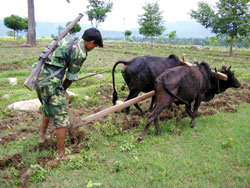|
|
As he readied his paddy terrace for planting last week, Ram Bahadur Gurung of Gumi VDC in Surkhet got a pleasant surprise. A group of armed Maoists volunteered to help him.
Some comrades ploughed the field, others used the hoe and the women guerrillas waded knee-deep into the slush to plant paddy. The People\'s War now has a different focus here in western Nepal: to win hearts and minds.
Aware that the people blame them for past brutality, the rebels are on a public relations offensive. Ram Bahadur had got used to being forced to give shelter to Maoists and feed them. Now he doesn\'t know whether he can trust the guerrillas who still have rifles slung over their shoulders. "They say there will be peace now," says a wizened 70-year-old farmer, "they help us in the fields, so we are not as afraid as we used to be."
Just three months of ceasefire, and it is hard to to tell that these lush green hills have been soaked with blood the past ten years. The Maoists murdered party workers, teachers, traders. More died in brutal crackdowns by state security.
The rebels cut suspension bridges, blew up telecom towers, roads, radio transmitters, hydropower stations, making this isolated region even more remote. Development has been set back decades, as VDC buildings, health posts, schools and drinking water systems were demolished.
"We were at war and had to obey party decisions," explains Comrade Jitendra, "we won't make that mistake, the focus now is not the war."
It is clear that comrades who till recently believed that power came out of the barrel of a gun now seem to be convinced that power comes from the people. "If the leaders decide to disband the PLA we will go along with it," says Comrade Pratik of the rebel\'s Sixth Division.
Many still think the ceasefire is another Maoist ploy. But Comrade Ramesh appears contrite, "We will now turn from destruction to development."



